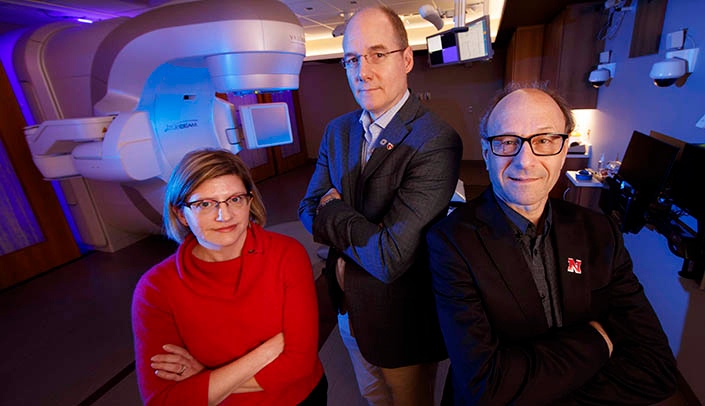The U.S. Department of Defense (DOD) has turned to the University of Nebraska to jumpstart the development of drug therapies to protect military service members from the effects of radiation exposure.
In an environment where for-profit pharmaceutical companies are often reluctant to embark upon financially risky drug discovery efforts, the unique four-pronged partnership established by the university and the DOD could shorten the U.S. military’s wait for drugs that prevent and counteract the effects of radiation exposure.
“It’s an exciting collaboration among the federal government, our state university and two of its premier research campuses, UNMC and the University of Nebraska-Lincoln, and consultants from private pharma who are Nebraska alumni,” said David Berkowitz, Ph.D., professor of chemistry at UNL.
This team operates under the auspices of the NU National Strategic Research Institute (NSRI), one of 13 University Affiliated Research Centers (UARC) supported by the DOD. Nebraska has the lone UARC entrusted by the military to work on chemical, biological, radiological and nuclear threats.
“This research represents the broad capacity of the University of Nebraska and its alumni consultants to tackle potentially hazardous radiation exposures around the world,” said Lt. Gen. (Ret.) Robert Hinson, NSRI’s founding executive director.
The NU project for the Defense Health Agency (DHA), and in collaboration with Armed Forces Radiobiology Research Institute (AFRRI), has reached a second increment — potentially awarding nearly $11 million in federal funding over the next five years. NU researchers will look for therapeutics candidates the U.S. military would need to protect troops from radiation in case of exposure, as in a nuclear accident or a nuclear weapons incident.
Leveraging the full, collaborative strength of a united university system — multiple campuses, a network of successful alums — directed by the DOD, is something new for NU.
“I’ve never been involved with anything like that before,” Dr. Berkowitz said. “This team came together as a joint vision between the team leadership and our DOD funders, and it’s pretty unusual across the country to see such a public-private-government partnership.”
In fact, the university hopes this opens the door to continued partnership with private pharma in the longer term, through identifying and developing therapeutic candidates that have dual-purposing potential, Dr. Berkowitz said.
Dr. Berkowitz is co-primary investigator of the project, with Ken Bayles, Ph.D., professor of pathology and microbiology at UNMC.
Dr. Bayles said if private pharmaceutical companies are leaving a gap, the University of Nebraska is eager to step in.
“We’ve pitched this concept to develop a virtual pharmaceutical company, a drug development pipeline that would coordinate the activities of all the expertise we have across all of our campuses and develop capabilities to move molecules forward for drug development,” he said.
Handfuls of NU’s top scientists will work on medicinal chemistry, metabolomics and bioinformatics in order to move potential drug candidates toward clinical trials. “We’ll be coordinating all of these aspects like a pharmaceutical company does,” Dr. Bayles said.
“If we do it right, this pipeline concept is an opportunity to build the economy in Nebraska, build the pharmaceutical industry in Nebraska,” Dr. Bayles said.
“It’s a complex machine,” Dr. Berkowitz said of the new multi-pronged, multi-campus team. “And it’s working pretty well now.”
“We are extremely proud to be affiliated with this research and the impact it can have for the Department of Defense, Defense Health Agency and other agencies as well,” Lt. Gen. Hinson said.

Hi Becky, Congratulations! Well done.
Congratulations d j Well done.